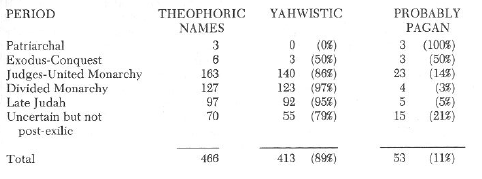Was the name YHWH revealed for the first time to Moses or did the Patriarchs also know the name YHWH? Ex. 6:2-3 states quite clearly that the Patriarchs did not know the name.
God spoke to Moses and said to him, “I am the LORD. I appeared to Abraham, to Isaac, and to Jacob, as God Almighty, but by my name the LORD I did not make myself known to them. (Exo 6:2-3 ESV)
Despite this explicit statement, it is often stated that the patriarchs must have known the name YHWH because the name is used by the patriarchs when addressing God and vice versa. It is therefore suggested that Genesis 6:2-3 means that God did not reveal a new name to Moses but gave a more complete and nuanced understanding of the name. This interpretation has influenced the NIV translation of the verse.
God also said to Moses, “I am the LORD. I appeared to Abraham, to Isaac and to Jacob as God Almighty, but by my name the LORD I did not make myself fully known to them. (Ex. 6:2-3 NIV)
There is no textual reason to insert the word ‘fully’ into the text. That the name YHWH appears in Patriarchal narratives should not surprise us. That was, after all, the most familiar name for God in the time period in which the narratives were composed! What is more telling is a simple of break down of names in the Bible according to their time period and their theophoric element. (The theophoric element is the part of a name that refers to God. It might be ‘ya’ in Hezekiah meaning “YHWH is my strength” or ‘el’ in Daniel meaning “God is Judge”, etc.)
Here is a little chart from Tigay’s book ‘You Shall Have No Other Gods’.

Tigay does not count names with the theophoric element ‘el’ in them. If he did, then there would be many more theophoric names listed for the Patriarchal period. (Abel, Mahalalel, Abimael, etc.) In contrast, there are no Yahwistic names from the Patriarchal period. The takeaway is simple, the Patriarchs did not know God by the name YHWH. The use of the name YHWH in the patriarchal narratives may be anachronistic, that name being the familiar name by which God was known in the time period in which the narratives were composed, or the name YHWH was used to make a theological point, YHWH being the revealed name of God.
But as Tigay points out, the real interesting part of this chart is the proportion of names with pagan theophoric elements (11%) compared to those that are Yahwistic (89%). More on that in another post.
Bibliography
Tigay, J. H. (1986). You shall have no other gods : Israelite religion in the light of Hebrew inscriptions. Atlanta, Ga., Scholars Press.